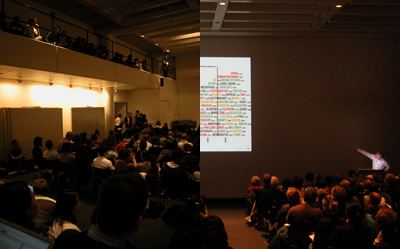
Sep '06 - Dec '09
??-Line begins
5:15 got into the line with at least 200 people in front of me, lecture starts in 45 minutes.
5:30 They start letting students in, by now the line snakes through a big portion of the second tray
5:35 I get into Piper Hall (GSD's auditorium), it is almost full, I find a nice little seat though.
5:50 Piper Hall reaches its capacity of 400 people and no one else is allowed in. There are students seated in any place they can.
5:56 Toshiko Mori introduces Rem
5:58 Rem begins
The following is a small description of the lecture as I saw it through my tired eyes. It may be way off the point but it is my reading and understanding of what was argued in the lecture.
The lecture, as the title says, was about Preservation and what that may or may not mean.
Selected Slides and comments:
-The Reichstag: why not preserve its ruins after the fire of 1933?
-Berlin's Palace of the Republic- After 1989 what do you with it?, well for many years they did nothing. After an asbestos removal and for political reasons it became hollowed and empty inside and the question now is: do you rebuild it or leave it as a shell with many possibilities? How do you preserve something like that?
-OMA's Bordeaux House became a preserved building, now it cannot be touched neither by architect nor the client although needs changed, is that preservation?
-Main question of preservation: is it just a technical term? Does it mean to freeze something in its current state?
-China uses same criteria as the west to preserve: the monumental, the political, and the beautiful. Why not a different kind of preservation? What about systems that would preserve whole areas randomly so you can preserve different and varied pockets of architecture (from all years and urban stages) and life.
-Harvard's De-Moralized Zones and their superficial treatment of preservation. (See his book ”˜content')
-He ended by speaking of the problems of current ”˜preservation' and nostalgia as he sees them in Europe and in the U.S.
favorite quotes (as I wrote them down anyway):
“Design is over-taking politics all over the world”
“Authenticity (I took this to mean design that fakes historicism) is leading to the death of change”
6:52 End
Left the lecture with more questions than answers, and I am sure we can all agree that's a good thing. The most fascinating point for me was the possibility of random preservation pockets that equally preserve the ugly and the pretty, the rich and the poor, the old and not so old, the monumental and the mundane.



3 Comments
I love this topic. Wish I had seen the lecture.
Seems like the idea of "preservation zones" is a joke, a riff on the short-sightedness of the unthinking need for stasis.
Is there an argument for intelligent preservation? The multiplicity of approaches, even within one building if not with a neighborhood or urban context? That is, the combination of adaptive reuse/modification, restoration, and pathological stasis???
I was at the lecture as well q, altho my fellow MIT'ers and myself were in auxiliary seating ... oh well.
Rem did bring up some interesting points, altho for some reason I found myself slightly irritated with him the whole time. I can't put my finger on it. He just had this "i've got to catch a flight, but i've got 45 minutes to kill" sort of vibe going on. anyway, I was very much in agreement with his comments about the areas in Beijing that he found to carry the "essence" of the city but would not qualify as being "preservable." The comments made about the increase in what "heritage" has come to define within the past 5 years were also rather thought provoking (for me, anyway).
mpsyp, seems to me that the notion of intelligent preservation is what he was aruging for. A hybrid condition that more truly documents and projects.
I think that the provocation of preservaiton zones can be read as a joke, but it is merely meant to make you think about the issue and whats at stake.
Arjun, I agree with you there seemed to be something else going on. some sense of frustration with the university and school, maybe? I may go to the MIT lecture to compare, so save me a seat!
Block this user
Are you sure you want to block this user and hide all related comments throughout the site?
Archinect
This is your first comment on Archinect. Your comment will be visible once approved.